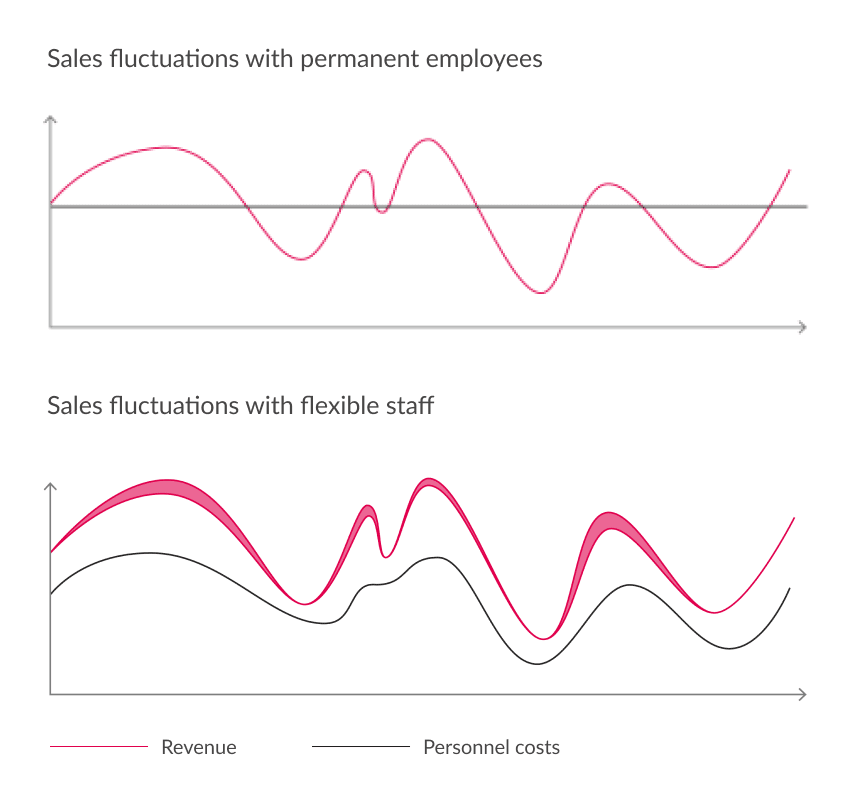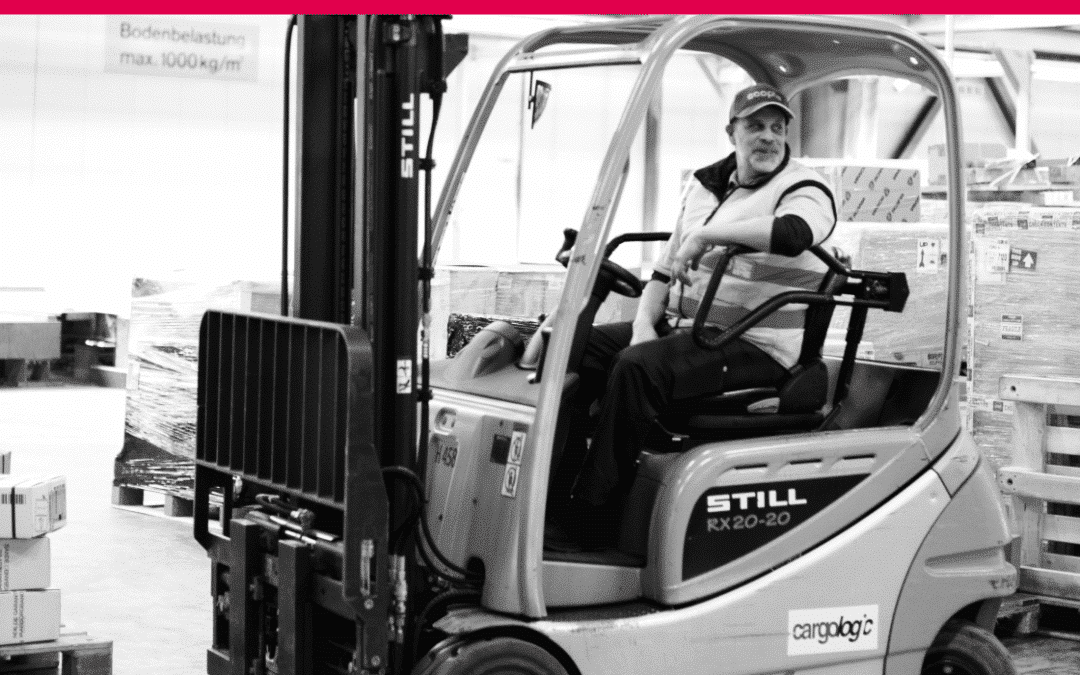
by Corinne Keller | Mar 29, 2021 | Information for companies
If you’re not making use of digital solutions in your recruitment process, you’re probably leaving some efficiency gains on the table. Technology has been redefining and revolutionising the way businesses find talent. With the ability to create job ads in seconds and vet candidates online, organisations can hire faster and better than ever. Businesses that rely on digital solutions are reporting significantly improved operational efficiency, greater profits and reduced cost-per-hire as the top few benefits.
The global pandemic has heightened the need for digital solutions, with McKinsey research citing that COVID-19 has accelerated digital transformation by seven years. Can your business afford to be left behind?
Digitalisation is changing full-time recruitment
Finding the right full-time employees used to be a painful, drawn out process. Using traditional recruitment methods, the Swiss average time-to-hire is up to 90 days. However, technology is changing this fast. Whether it’s onboarding niche talent or utilising data to reduce bottlenecks, HR teams are increasingly relying on digital staffing technology for full-time talent recruitment – and they’re seeing results:
- Reduced cost- and time-to-hire. The longer it takes to fill a role, the more business resources and time it requires. Drawn out hiring processes also mean greater risks of losing out on top candidates. Technology, for example applicant tracking systems, help by allowing more people to participate in the screening process in real-time, as well as by automating candidate communication to allow for a smoother onboarding experience.
- Access to real-time data. Accessing real-time data means that businesses can make informed decisions to build a smart workforce. Having access to insightful metrics allows recruiters to monitor and eliminate bottlenecks in the hiring process, leading to more efficient turnaround and greater conversion rates. With the benefit of backend data, recruiters can also track live responses to amend job postings if they are not attracting the right candidates or increase acquisition spend if they aren’t attracting enough of them.
- Virtual recruitment. The temporary pause on face-to-face hiring hasn’t stopped businesses from finding high caliber talent. Throughout COVID-19, hiring companies have implemented virtual onboarding and online interviews to screen candidates anywhere, any time. Such processes have enabled recruiters to conduct essential training and right to work checks with ease. Similarly, virtual recruitment allows for borderless talent acquisition, helping businesses to easily recruit for niche skillsets in tricky locations.
Technology enables new ways of hiring: The rise of digital staffing platforms
Whilst technology has made full-time recruitment more efficient over the last few years, it also enabled an entirely new kind of hiring. The use of digital staffing platforms has increased nearly 300% in the last three years. Digital staffing is a faster way of finding temporary talent and it’s clear to see that it’s not just a hype.
Temporary staffing itself is not new, but on-demand, short-term staffing has been made possible by technology. It enables hiring companies to build pools of regulars: high-quality, fully onboarded workers whom they can rely on when demand goes up unexpectedly. Typically time-consuming tasks are fully automated with digital staffing, meaning hiring can be reduced to a few clicks when screening, filtering and sorting applicant data, allowing for reduced time-to-hire, fewer dropouts and more quality hires.
How a flexible workforce can help your business
With all the benefits from technology that we can see in permanent recruitment, digital staffing has opened up a whole new world of potential for flexibility in your workforce. Digital staffing platforms such as Coople help to stay flexible, agile and cost-efficient.
Here’s how it works:
- Source specialist talent: it’s easy to find niche talent with a digital staffing platform. Thanks to advanced algorithms, you can overcome traditional recruitment limitations – allowing for faster job matching and greater quality and volume of hard to find candidates.
- Cohesive workforce management: get real-time status updates on shift coverage, attendance and time-tracking to make informed hiring decisions. Take quick actions as plans change: add shifts as and when you need them, request more workers and stop hiring any time.
- Flexible, last-minute coverage: you can scale up and down to meet demand with a flexible workforce. Read more to understand how Coople helped a leading supermarket chain find 600 skilled flexible workers for urgent cover in less than 48 hours.
- Cost-effective with zero commitment: reduce costs and manual processing by outsourcing recruitment, administration and payroll. With no subscription, upfront fees, setup costs or minimum hours, you can avoid surprise fees and find quality workers without any hiring commitments. Read to find out more about Coople’s flexible pricing structure.
Are you in need of a responsive, flexible recruitment strategy to get up to speed with modern staffing challenges? Find out how your business can benefit from Coople’s digital staffing solution today.

by Corinne Keller | Mar 2, 2021 | Information for companies
We have experienced high levels of global market uncertainty for more than a year now. Forecasts contain many unknowns which means that corporate decision making has become an even greater challenge. Implementing a good HR strategy is no exception.
So what does good staff planning look like in times of great market uncertainty? Read on for some insights:
Assessing the impact of COVID-19 on the hiring landscape
The Corona pandemic has a drastic impact on hiring: according to Staffing Industry Analysts (SIA), 38% of companies globally have temporarily paused all their talent acquisition. Another 17% of companies reduced the number of planned hires in 2020.
Within the DACH labour market the trends have been slightly more positive. According to a survey of more than 1’200 HR professionals by XING, 47% of respondents in Switzerland are sticking to their staff planning. Only 21% of companies in Germany, Austria or Switzerland have stopped recruiting altogether, while 20% are hiring fewer staff than originally planned. 7% of companies stated that they had not yet dealt with the consequences of Corona on personnel planning.
However, despite all of this, 73% of the Swiss companies surveyed onboarded new staff since the start of the Corona crisis in mid-March 2020.
Temporary staffing: what is it and how is it used to navigate uncertainty?
Businesses use temporary staff to reshape and respond to a COVID-19 economy where customer behaviour and demand varies drastically day by day. Throughout extended lockdowns and changing guidelines, temporary staffing provides a clear solution for overcoming hiring risk and last-minute operational gaps.
A temporary workforce also affords flexibility to allow for ease of scaling. In an uncertain market where ramping up and down with demand is essential to protect budgets and maximise profits, responsive staffing is not only critical for recovery, but growth too.
A Coople survey with 185 Swiss companies in September 2020 revealed that companies with flexible staff expect to recover more quickly from the impact of the COVID-19 pandemic than those that employ only permanent staff. Most companies employing temporary workers expect to recover within 4-12 months, whereas the majority of companies that do not hire temporary workers expect that it will take more than 12 months to recover.
How Flaschenpost and a supermarket chain confidently navigated the crisis with flexible staff from Coople.
Digital staffing platforms such as Coople match flexible, temporary workers with employers in need of temporary staff with specific skills. Throughout the pandemic, Coople has supported hiring companies such as Flaschenpost and a nationwide supermarket chain in finding quality staff across the Retail & Logistics, Office and Cleaning sectors.
- Flaschenpost, the largest online wine shop in Switzerland, urgently needed to increase its workforce to cope with the huge increase in demand as a result of COVID-19.With the help of Coople’s flexible workforce, Flaschenpost was able to build up a favourites pool of 25 flexible workers within a very short time, having 11 favourite workers on duty at any one time for 5 days per week.
Read more about how Coople helped Flaschenpost build a favourite pool of skilled, reliable workers here.
- A discount supermarket chain worked with Coople to cope with exceptionally high demand as well as to ensure the safety of consumers in their shops after the outbreak of the coronavirus. Coople’s unique algorithm enabled the supermarket chain to recruit more than 600 professionals in retail, logistics and security & hygiene across Switzerland in less than 48 hours. Thanks to the flexibility of the Coople platform, the supermarket was also able to scale down immediately when security measures were relaxed again.
Read more about how a supermarket chain benefited from flexible, crisis-proof workforce planning with Coople here.
Are you ready to confidently lead your company out of the crisis together with Coople? Click here to find out how to make your workforce planning resistant to market uncertainty.

by Corinne Keller | Feb 17, 2021 | Information for companies
Flexibility is key for the long term well–being of businesses, especially in times of uncertainty. The climate crisis, war of invasion in Ukraine, labour shortage, pandemic; the economy has been presented with many challenges. This year, companies will face complex questions like: “How long will the war in Ukraine last?”, “How will rising commodity prices affect my business?”, “What will the forecast for the inflation rate be for Switzerland?” When the economy is hit with such storms, fewer risks are taken.
Permanent jobs are declining. Creating (or maintaining) such positions will always have a risk, but especially when the future is more unpredictable than usual. During these times, it is imperative that businesses adopt cost-efficient, proven and flexible workforce planning initiatives in order to minimise business risk and reduce costs.
What was once known as a “nice to have perk”, flexibility is now essential for maximising profit, reducing financial risk and successful growth.
Why responsive workforce planning matters – especially in uncertain times.
Scheduling team rotas can be challenging even with proper planning. That’s because irregular demand is difficult to plan for. When emergencies happen, managers often hire whoever is available, rather than the best person for the job. Hiring the wrong staff can be a costly, complex and time-consuming process. Previous survey research indicates that the consequences of a bad hire include low productivity, higher recruitment costs, missed business opportunities and minimal revenue.
During the pandemic, it was visibly clear that hiring activity changed dramatically around the globe with 38% of companies pausing their recruitment efforts. Now, workforce quality remains a priority for 60% of global businesses. It’s evident that in the current climate, hiring the right person is more important than ever.
As the economy continues to face multiple challenges, some businesses have already successfully adapted their staffing strategy to scale up and down with irregular and unpredictable demand. They couldn’t have done it without the right workforce planning.
Why workforce planning is not resistant to crisis.
Many traditional staffing solutions can’t keep up with highly fluctuating demand and uncertain market conditions, mostly for the following three reasons:
1. Increasing the workload of the core team can backfire.
Asking the core team to work overtime or on reduced hours can lead to payroll and contractual complexities, making it slow to act. This approach can also cause friction in the team, especially if workers have limited input into scheduling. You might lose your team over this if you do it too often.
Understaffing brings on stress through work overload, while overstaffing results in boredom and inefficiency. This will lead to rising turnover rates and falling profits.

2. Traditional temp agencies lack of speed.
Traditional temp agencies provide a convenient solution for improving staff coverage. Some can occasionally handle short-term requests, but few can help in emergencies when last-minute cover is needed for sick & absent employees or for meeting sudden surges in demand. This is because their operations are geared towards manual processing. At the same time, hiring companies increasingly demand more control over who they hire as well as real-time information on the status of the vacancy. This can lead to tension and failure when working with traditional recruitment agencies.
As businesses plan for a future-proof workforce ,more and more organisations are turning towards automation and digital transformation as a proven, seamless staffing solution.
3. Traditional workforce management tools don’t scale easily.
Tools that enable the core team to self-schedule and managers to integrate their network of flexible workers lead to more transparency and increase efficiency of internal processes. However, such solutions are limited by the size of the manager’s network. They are only scalable if they enable access to a steadily growing number of fully vetted flexible workers through a strategic staffing plan
Workforce planning – why responsive staffing matters.
Responsive staffing, enables you to recruit and schedule your workforce in line with fluctuations in demand. Getting responsive staffing might be complex, but the solution needn’t be. A great solution should:
- Only charge you for completed shifts for ‘true’ responsiveness.
- Allow you to agree on work contracts in a fair, efficient and frictionless way, even at a short notice.
- Provide you with access to a large pool of fully vetted workers.
- Handle complex shift requirements on demand.
- Allow you to choose who you hire and offer full financial transparency.
- Allow you to build your own pool of favourite workers who are accessible on demand.
Does your staffing strategy tick all of these boxes?
Coople – the digital staffing solution that pays off.
We provide an all-in-one staffing solution for businesses of all sizes. Whether you’re looking to reduce hiring risk or overcome operational gaps, you can future-proof your business strategy with Coople’s flexible platform.
Cost transparency – you only ever pay for completed shifts.. Access line-item breakdown of fees, salaries and national insurance for every shift hour
Increased profit – reduce your fixed costs by flexibly adjusting team sizes to current needs as demand curves fluctuate.
Hire 24/7 – post new jobs at any time and hire workers on your own. Coople’s matching algorithm finds the best workers for you in seconds – thanks to the new “auto-hire” feature.
Assured quality through transparency – see job histories, ratings from other employers and which favourites pools they are part of. Never recruit blind again.
Build your own ‘favourites’ pool – save lists of favourite workers you trust , so you can keep hiring them at speed in the future.
End-to-end convenience with one solution from sourcing to payroll, saving hiring managers time. You can modify and reschedule hours efficiently, even on the go.
How workforce planning can succeed in uncertain times
With a substantial number of flexible staff, a cost-efficient HR strategy and strong staffing company on your side, the impact of the ongoing crisis can be significantly reduced now and moving into 2023. This is beneficial for short-term, as well as long-term positions that companies plan on filling but wish to place under probation for a short period.
With Coople, flexible workforce planning becomes an experience that pays off. We connect reputable companies with ambitious workers who want to make a difference today and are ready to learn new skills tomorrow.
Register with Coople today – no subscription or set-up costs.

by Corinne Keller | Dec 2, 2020 | Information for companies
A recent market study run by Coople, in cooperation with the independent market research institute GIM Suisse, indicates that more than half of Swiss businesses are planning to hire temporary workers in the near future. With many businesses struggling to effectively plan in this situation of extreme uncertainty, digital staffing platform and EHL Alliance founding member Coople, advises on how to make the most of flexible workers to reduce risk and maximize profits.
While using agency workers on a short-term basis has supported many businesses during the pandemic, it is now becoming clearer that the ability to effectively plan long-term will not return any time soon. Market conditions change on an almost daily basis and we are all struggling to keep up. Many business owners and HR managers are taking the opportunities of enforced closure to take a closer look at their human resource strategies and come up with solutions which will not only withstand the gradual return to business as usual, but also stand the test of time.
When demand uncertainty is high, the right staffing strategy can make or break a business. If you staff for low demand, you might miss out on much needed revenue. If you do the opposite and demand is low, costs can quickly become prohibitive.
Now is therefore the time for businesses to think about short-term workers for the long-term. There are three important things a business needs to get right to make this work:
1. Think about flexible staffing as a core strategy, not just for emergencies
Most businesses prefer to have regular workers to rely on – workers who understand their brand, products and processes. This can be achieved with flexible workers. It just requires consistency.
Flexible workers are not B-employees. They are ambitious and talented people with personal and career goals that can be achieved more easily with flexible schedules. All you need to do is set up adequate processes to onboard and manage them in a way where they can perform at their best.
By building up a larger pool of preferred workers who work in your business part-time but regularly, you can keep up the quality and retain knowledge while increasing your flexibility significantly. Such a pool can easily be built on digital staffing platforms, where businesses can hire workers and make them favorites if they are a particularly good fit for their team. Building a relationship with these workers over the years also increases the chances of them being available during peak times that occur during certain seasonal periods such as Christmas.
2. Don’t compromise on quality when hiring, set your workers up for success
Hospitality and retail businesses, for example, rely heavily on the interpersonal skills and attitude of their workers. Other sectors have different criteria. By building a pool of qualified candidates who you have personally tested, you will be ready for all eventualities. Using a digital platform can save you additional time during the recruitment process because you are able to not only see workers’ CVs, but also previous experiences and the ratings of other employers on a simple interface.
Once you have made your hires, ensure flexible workers receive the same essential training that you would provide to new full-time hires. Providing a high-quality on-boarding process will set your workers up for success, so assume that you will re-hire these workers and that your investment will pay off. To give you maximum flexibility in the short-term, flexible work strategies rely on longer-term commitments.
3. Don’t overload your own team with admin and payroll
From day one, flexible workers automatically have a legal right to minimum wages and social security. The minimum wages can be especially very complicated because you need to consider the location and age of the worker, as well as their working times (minimum wages, for instance, differ for weekends and nights). Before hiring, you also need to make sure you do all the relevant right-to-work checks.
If you pursue a flexible work strategy, it is worth spending some time on deciding whether to hire directly or work with a staffing agency. One benefit of using an agency is that you outsource the HR risk. You pay the agency like any other vendor and you are not responsible for any of the above. The agency will track working hours in detail and you avoid the admin cost of running a potentially complicated payroll. Another benefit is that agencies can give you guidance on competitive wage levels, which is especially relevant during peak season.
The downside? You need to pay an agency fee. However, you can avoid retainers and flat fees by choosing one that charges via a multiplier on each hired hour. It is worth doing the math because an agency fee can still work out cheaper than doing payroll in-house.
Conclusion
Flexible staffing is a powerful tool, provided it is used correctly and organizations behave ethically towards those they hire. More than half of the businesses that Coople recently interviewed have implemented a strategy for hiring agency workers. Can you afford not to?

by Annette Burgard | May 7, 2020 | Information for companies
The Swiss Federal Council is lifting the lockdown faster than planned for all restaurants and bars. On May 11th, restaurants will be able to reopen, giving them only a few days to plan their staff and operations. Coople, Europe’s largest digital platform for flexible staffing solutions, can enable the hospitality industry to access a vast pool of skilled flexible staff instantly to cover planned and unplanned peaks in business effectively.
Plan for the right staff at the right time
A lot of restaurateurs, business owners and F&B managers are struggling with staff planning. The strict guidelines shared by the Federal Government last week will force venues to rethink their planning, and to react fast to meet their demand with the right amount of staff.
With great uncertainty in the weeks and months to follow, flexibility will be a top priority for hotels, bars and restaurants, as demand may return slowly or – in some areas – ramp up rapidly. These establishments will therefore need support in recruiting and hiring temporary workers, as well as keeping its full-time employees as flexible as possible to meet the business needs, manage their fixed cost effectively and maximize its revenue.
With so many unpredictable events that can happen within a short space of time, there is a clear need to move to models that can react to these changes in real-time – using digital solutions to plan staff in a way that helps cover planned and unplanned peaks in business with skilled, experienced and flexible workers.
Find and plan your staff with Coople
Coople allows hotels, restaurants and bars to hire skilled staff instantly. The algorithm matches businesses with flexible workers who have the right skills and experience. To date, Coople has more than 300,000 registered ‘Cooplers’ (flexible workers) in Switzerland. It also features rating tools and timesheet approval.
Coople, who already operate with a large number of restaurants and hotels all over Switzerland (including Compass Group, ZFV, Migros Catering Services, Ragaz Catering, Bürgenstock Resort, Bindella), is now working at full capacity to help restaurateurs overcome these uncertain times and better manage their staffs.
With Coople restaurateurs get 24/7 access to the platform, the ability to instantly publish jobs and hire skilled flexible applicants, an existing large pool of more than 100,000 experienced hospitality professionals (including chefs, kitchen staff, waiting staff, bar staff, etc.) and extensive administrative management of the staff.
If you are also looking for qualified, flexible personnel, register today free of charge on our platform.
I need staff
Looking for a job?
Our clients are continuously looking for highly motivated and skilled individuals to join their team. Whether you want to find a flexible job to generate additional income, gain experience in new areas or pursue a flexible lifestyle, Coople can help you find flexible work that is tailored to your needs. Every day, our clients publish hundreds of jobs in retail, logistics, hospitality or administration in order to help you match your skills with the right job opportunity. During the COVID-19 crisis, exciting roles have emerged on our platform to help our clients to cope with their urgent staffing needs. Find more about these roles by registering here.
I need work
About Coople
Since Coople launched in Zurich in 2009, more than 400,000 flexible workers and 20,000 companies have registered on our flexible work platform. Coople provides flexible staffing solutions for the catering, hotel, retail, aviation, logistics, events and promotion and office sectors. The company has been active in the UK since 2016.
For more information, please visit www.coople.com or get in touch directly at info.ch@coople.com

by Annette Burgard | Mar 17, 2020 | Information for companies
Are you looking for qualified staff to help fill shelves or answer calls? Or are you in need of staff with a valid driver’s license? Our flexible staffing platform with more than 300,000 registered workers might be the solution for you.
Register your company here and we’ll get in touch with you shortly.
We have qualified, motivated and highly flexible staff in the retail, logistics, hospitality, events, aviation and office sectors.
Here are some great examples, how Coople could give your business a temporary relief:
- We are working closely with a large supermarket chain in Switzerland on their contingency planning for the exceptional demand during March and April 2020. We help them with both cashiers and logisticians.
- Several well-known e-commerce and food delivery companies rely on Coople staff all year round to deliver exceptional customer service. Currently we’re working hard to help them manage the increased call volumes.
- More than 30’000 of our Cooplers work as drivers for our clients – doing deliveries or working in warehouses.
Would you like to discuss your needs with one of our staffing experts?
Register your company here and we’ll get in touch with you shortly.
WHAT IS COOPLE? Find qualified staff quickly and easily.
Find out more about how the Coople platform works once you’ve registered your company for free.
Whether you’re looking for experienced chefs, warehouse staff or office assistants, the Coople platform can find the right workers for your open positions. All you have to do is select the job profile and experience level to get started.
With Coople, you’re always in control over how much you pay (as long as it isn’t below minimum wage). When you create a job, you set the hourly wage. There are no set up costs or admin costs.
Creating shifts and adding working hours can be done in seconds. Now it’s just a case of publishing the job.
- Review and hire applicants
Nearly immediately, the first applicants will show interest in your job. You’ll receive a notification and can view all the candidates’ CVs and previous ratings. Hire with the tap of a button, from either our desktop version, or the Coople Hire App if you’re on the go.
For questions and more information click here.






